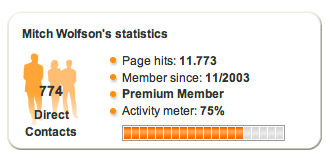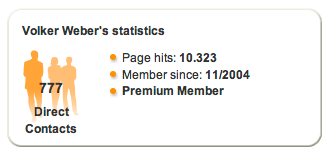Two years of openBC/XING
by Volker Weber
It has been two years minus one day since I finally accepted an invitation to openBC, now XING. Could have waited another day to write about it, but I thought 777 contacts would be a nice number, and I am adding about one contact every two days, so I could not have both.
There has been lots of talk about social networks, but XING is not a social network to me — it is an address book. Let me explain: I have stopped collecting business cards. I enter a name into XING and then connect to the person I just met. If they are not in, I invite them. If they don't want to play, that's OK, but I will probably lose them. Actually, it hardly ever happens that a person is not in there. I have a few good friends, who never adopt anything unless everybody else has, but those I am not losing track of anyway.
For everybody else I now have a good address book, which they keep up to date. And this is so much better than if I had to do it myself. I have subscribed to a few RSS feeds which show me, when somebody gets promoted or changes the company. This was never easy to track and now it just pops up. In the past I have lost some contacts because they moved twice. Just recently I could not track somebody down because his mobile phone number has changed again.
When this whole thing started I could not imagine to ever have 483 contacts like Mitch, then one year later we both passed 600. Today we are both beyond 750:


XING has added some interesting features in the last two years, including the aforementioned RSS feeds. But they desperately need to add APIs or services which let their users interface with their data. It's absolutely ridiculous that I cannot export all of my contacts into one vCard file. There is no RSS feed for my inbox, nor for my events. I cannot subscribe to them via iCal. There is so much more one could do to turn this into a useful service. All of these features could be premium offerings which require a paid subscription.
So far I have not had any bad experiences with the site. I am not using it's full potential, since I did not fill out a profile, nor have I used its discussion groups. But I have rediscovered quite a few people that I had lost, and I was rediscovered by many others. It has been an interesting ride, and I am going to stay in.
If you are not in and want to play, then here is your invitation.
Comments
Ok, but what are you getting from it?
And I thought I just explained that ...
The sites come with big promises and so far I've never seen the real benefits take place.
Volker, I'm intersted as to why you choose to use Xing/OpenBC rather than LinkedIn which appears, at least here in the UK, to have a much higher profile (and therefore more active members) than Xing does?
I have never done anything more with LinkedIn than accept invitations. For me, the major goodies about XING are:
- the UI is great - I can easily get to the information I need
- the "who looked at my profile" and "who did recently change jobs" searches
The "who looked at my profile" thing is a great way to attract recruiters, if you need to ;)
Regarding address book functionality: I've been nagging them to play into something like Plaxo, and they always said "we'll come up with something even better really soon now". Unfortunately I'm still waiting.
Stuart, I am listed on both. XING works for me, LinkedIn doesn't.
There are some good suggestions in your post. I think some of them could be implemented easily.
And: Yes, we will be offering an API, we are currently working on it.
Andrew, have you read the article? To sum it up for you: for Volker it's the perfect address book, due to the fact that his contacts keep their data up to date.
Andrew, to me (and to Volker as well, as he explained) the benefit is outside the scope of the promises the site owners / marketers make. The benefit is to not loose contact with friends, acquaintances, business partners, or other people. The benefit is to have an up-to-date address book because (ideally) the addressees maintain their record in your address book.
Admittedly (and Volker also pointed this out) there is a lack of integration with local applications which require that information (most simply: your e-mail client). There's a tool which allows for a cross check to fill up your XING address book from your local address book, but not vice versa (it's NOT a sync). But for a manual tracking if you receive an undelivery failure, it's still worthwhile.
And I too had lost contact to a couple of people and found them after years of no contact, with the help of OpenBC/XING. And another usecase: When I'm teaching in an Executive MBA, I receive a list of class members before hand. I typically scan for their profiles on OpenBC/XING and check how I am connected to them. Normally, it's less than three links inbetween (ok, the Swiss community is probably smaller than the German or U.S. counterpart). Too often, there are contacts we have in common and let me tell you, this makes the start of interaction a whole lot easier. Try that with your next cold acquired client or some other people you will have a meeting with. I'm sure it'll help.
Andreas, from your post I assume you work with the XING guys. Good thing you are listening here. But then, the link you provided with your name makes me worry we won't get what we need. ;-) (No personal offense intended!)
Ragnar: https://www.xing.com/profile/Andreas_Gehret :-) Dunno, if it's worth of it.
Ragnar, I fixed the link. Also note, that I have a back channel to some of the developers behind XING. They do listen, trust me.
@ragnar: what's an api without people finding it useful & building stuff with it? so we're paying attention to what people want to do with it.
btw. you can find andreas here.
oops, sorry, i should have proof-read that comment. it sounds harsher than intended!
what's an api without people finding it useful & building stuff with it?
That would be a bad API. ;-)
I trust you will provide a good API, or even better, a set of good services based on open standards and protocols. APIs are what Microsoft likes, standards and protocols are for those who want to build well connected systems.
I have named a few. vCard would let us tie the XING addressbook into our real one. iCal would let us subscribe to the events in our existing calendar (after all, how many parallel calendars can one have?). There is more. With SyncML one could synchronize those items with other data sources, and with LDAP one could query the directory directly from our mail client.
There are tremendous opportunities one could use XING in ways unseen today. If you won't do them, somebody else will.
Oh, and while you're at it: I would *really* appreciate at least a link to Plaxo. XING is where I go to interact with contacts, but Plaxo automatically updates my address book, which is something I have really come to appreciate.
Well - it will be standards and protocols.
By the way: Did you notice that we provided hCard microformats on the profile pages with the new site?
And for the API's functionality: In our particular case, data protection is still most important, more than functionality. While offering an exciting API, we still have to listen to those people that do not want their personal information spreaded over the whole internet :-)

